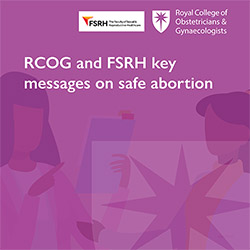Healthcare professionals can be influential advocates to improve access to safe abortion around the world.
Abortion services should be available to all women and girls to the fullest extent that the law allows.
Abortion care should also be available at primary care level, with systems in place for referrals to higher-care levels when required.
Pregnant people should also be allowed to self-refer to abortion care services.
Healthcare professionals can play a key role in ensuring this is the case.
They should know what the law allows in their country and be clear about the circumstances for when abortions are legal.
Where highly restrictive abortion laws put the lives of women and girls at risk, healthcare professionals can be strong advocates in raising awareness about the risk this poses to health and rights and in advocating for reform.
Healthcare professionals must not allow their personal beliefs to delay access to abortion care.
In countries where abortion is lawful, healthcare professionals have a duty of care to women, girls and pregnant people who are seeking an abortion and must not allow their personal beliefs to delay access to abortion care.
While in many countries healthcare professionals have the right to refuse to take part in abortions due to personal beliefs, all healthcare providers have an obligation to make appropriate referrals to ensure a woman’s access to legal abortion services is not delayed.
Healthcare professionals must provide information on the legality of abortion and where abortion care can be obtained; they must not refuse care in cases of an emergency and can only refuse direct participation in the procedure.
There are never grounds for providers to refuse to provide post-abortion care.
Task shifting increases access to safe abortion.
Abortion is often not a complex procedure.
A range of providers, including nurses and midwives, can deliver abortion care safely in a number of settings.
As with many other medical procedures, adherence to best practice standards will ensure that the most effective and the safest care is delivered.
To expand access, abortion and post-abortion care should be a mandatory part of medical training for doctors, midwives and nurses globally.
Healthcare professionals must be protected.
Healthcare professionals need the certainty that they can provide essential healthcare, including abortion and post-abortion care, without the fear of prosecution and harassment.
Intimidation or harassment of staff who are providing sexual and reproductive healthcare is unacceptable and measures should be taken to protect these services (for example, introducing buffer zones).

